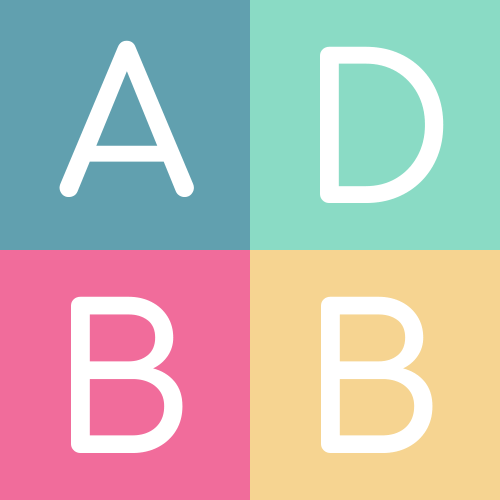Alarm Distress Baby Scale (ADBB)
Training in the use of the scale
Knowledge of the baby
This training will allow you to better understand the healthy and pathological socio-emotional development of the baby and to become sensitive to the signs that show the emergence of psychological distress in the youngest.
Make better decisions
This training will allow you to better evaluate the baby but also the effectivnenss of therapeutic interventions that can be proposed. This will save time, professional and financial resources.
Improve network practices
This training will enable you to develop a team consensus and more broadly a network consensus to coordinate assessments, decisions and case management.
What is the ADBB (Alarm Distress Baby Scale) ?
The ADBB is a scale for assessing relational withdrawal in infants between 0 and 24 months of age, with 8 observation items. It is an observation aid validated by research. The short version of the ADBB is the M-ADBB in 5 items which allows a rapid screening of babies in psychological distress. The two scales complement each other to coordinate first-line screening, then assessment and finally follow-up under intervention.
The ADBB was developed by Pr. A. Guedeney (child psychiatrist, Hôpital Bichat Claude Bernard, AP/HP Paris).
The Alarm Ditresse Baby Scale (ADBB) is an observation aid for childcare professionals (pediatricians, child psychiatrists, psychologists, nursery nurses, social workers, educators, and now also nursery assistants, etc. ….). It is used in clinics (screening), for the evaluation of interventions and for research.
Why should you learn to detect relational withdrawal ?
Relational withdrawal is a major component of the infant’s response to the alteration in relationship that occurs during the still face experience or clinically during maternal depression.
Relational withdrawal behavior is also one of the most stable behaviors during development, despite the major changes that occur in the first three years of life.
Early relational withdrawal behavior is therefore an important warning signal.
The baby’s defensive repertoire is in fact initially quite limited, and centers mainly around protest and withdrawal.
Withdrawal is more difficult to spot than protest, and yet it intervenes in numerous situations of early psychopathology, in an obvious or accessory way, whether it is a disorder caused initially by a relational disorder, or by an organic disorder, as in intense and lasting pain.
Pedagogical objectives of the training
General objective: To be able to detect and evaluate relational withdrawal in children between 0 and 24 months of age using the Alarm Distress Baby Scale (ADBB)
Specific objectives :
- Know how to define relational withdrawal,
- Understand the links between relational withdrawal and developmental risk,
- Cite key findings from research on relational withdrawal and the validity of the scale,
- Cite and define each of the items on the ADBB scale,
- Be aware of the legal, ethical and technical requirements for conducting an assessment,
- To detect a baby in relational withdrawal in all assessment situations in a reliable manner,
- reliably assess the severity of relational withdrawal.

You wish to be trained in a group within your institution?
Make a request for in-service training
We can intervene to train your team within your institution. This training can be organized at distance (which is pedagogically recommended) or in person.
Contact us to arrange a meeting to evaluate your needs.
The team behind the ADBB training

Dr. Alexandra Deprez
Psychologist, pedagogical director, instructional designer for online training and expert trainer.

Pr. Antoine Guedeney
Child psychiatrist, doctor of psychology, author of the ADBB Scale, scientific director, expert trainer.

Jocelyne Guillon
Director of humagogy, instructional designer for social utility training.
Mailing list
The mailing list will allow you to receive articles and news relevant to professionals working with families, parents, babies, children, adolescents.
The emails will be sent on a monthly basis and your address will not be shared with external organizations. You can unsubscribe at any time via a link at the bottom of the newsletter.
We keep your information private and only share it with third parties that make this service possible. Read our privacy policy for more information.
Ressources
Contact form
A few testimonials from our certified learners
«La formation m’a permis d’avoir un autre regard clinique quant aux situations rencontrées lors de notre pratique professionnelle. Elle a enrichi mon savoir, savoir-être et savoir-faire en ce qui concerne l’évaluation des intéractions précoces dans les premières années de vie.»
“The organization on Digiforma is simple and intuitive. There is technical support available at all times. The trainer adapts to the pace of the group and to special requests. The trainer’s high level of knowledge makes this training a plethora of information.”
“The process of learning by practicing observation is very relevant, it allows you to really refine the observation by focusing on the baby.”
“Lots of practice and a trainer who guides us and reassures us throughout it.”
Blog
Papers on ADBB and infant mental health
A validity and reliability study of assessment and screening for sustained withdrawal reaction in infancy: The Alarm Distress Baby scale
Link to the article in English: https://onlinelibrary.wiley.com/doi/epdf/10.1002/imhj.1018 The study presented in this article tackles a crucial challenge in the field of infant health: relational withdrawal in infants aged 2 to 24 months. Relational withdrawal is an...
To which extent social withdrawal at the age of 1 year is associated with IQ at 5–6 years old? Results of the EDEN mother–child cohort
Link to the article in English: https://link.springer.com/article/10.1007/s00787-017-0988-9 The present study aims to determine to what extent relational withdrawal at the age of one is associated with the child's IQ at the end of the preschool period. A total of...
Social withdrawal at 1 year is associated with emotional and behavioural problems at 3 and 5 years: the Eden mother-child cohort study
Link to the article in English: https://link.springer.com/article/10.1007/s00787-013-0513-8 The objective of this study was to examine how relational withdrawal in infants aged 12 months could predict emotional and behavioral problems at ages 3 and 5 years. The sample...
